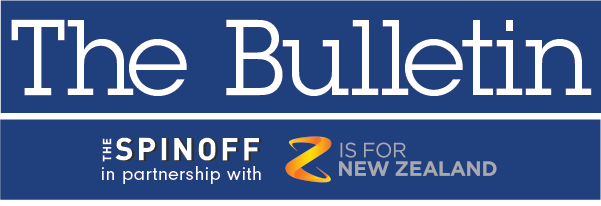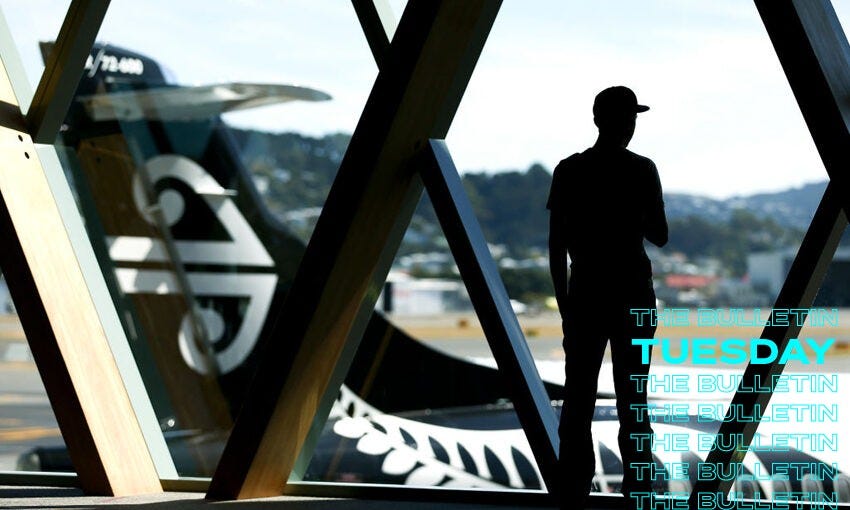Self-isolation trial to start next month
Up to 150 business people will try home isolation after an overseas trip, as government looks at ways to reopen ‘Fortress NZ’
Mōrena and welcome to The Bulletin for Tuesday, September 28, by Justin Giovannetti. Presented in partnership with Z Energy.
In today’s edition: The rise of David Seymour continues, vaccine passports for a ‘classic Kiwi summer’ and a modern spy trial, but first, big changes planned for MIQ.
It could be the beginning of the end of the closed border. (Hagen Hopkins/Getty Images)
A first step to reopening the country’s border. A self-isolation pilot, allowing 150 travellers to leave the country on a short business trip and return with only self-isolation at home will debut next month. First proposed in August, the trial will allow returnees to avoid managed isolation, where bookings have been exceedingly difficult to obtain. The pilot will be limited to fully vaccinated business people who have the full backing of their employers and will return by December. The prime minister has promised to name and shame any returnees and businesses that break the rules. And those rules are pretty strict; they'll need to be isolated in a private dwelling, without shared ventilation, but with cellular coverage to ensure frequent checks.
The pilot is a sign of the opening possible with high vaccination levels. The country’s border facilities have been the frontline in the Covid fight since last year, but Jacinda Ardern confirmed yesterday that changes are coming as vaccination rates climb. “There has been no room for error with this virus, it has been very tightly run,” the prime minister said of managed isolation. “The only reason that we are running this self-isolation pilot now is in preparation for a highly vaccinated population.” Stuff has written an explainer with more details on the pilot programme.
It’s a trial for three big changes proposed to MIQ in the coming months. So what else is coming? Shorter stints at border facilities are being contemplated, self-isolation at home for returning residents could start in the first quarter of 2022 and more rapid testing could be rolled out at work places and at the border, Ardern said after cabinet yesterday. The changes would be a relief for the tens of thousands of New Zealanders overseas looking to come home. As well as the frankly unknowable number within the country who haven’t been able to leave in nearly two years to see family, study or work abroad with confidence they can come home. Another release of 3,000 MIQ rooms is planned for this evening.
It’s not as significant as the change some have been calling for. The MIQ system is under a heavy level of scrutiny at the moment, especially from the one million strong diaspora. According to The Guardian, the closed border has led to questions abroad about what it means to be a New Zealander. While Sir John Key can write about a “hermit kingdom,” Ardern has been carefully dismissive of concerns. There was little subtlety when she noted last Monday that many of the thousands who queued in the MIQ lottery were only interested in spots around Christmas. Polling for the NZ Herald (paywalled) found that 64% of respondents don’t want changes to MIQ until at least 90% of the population has been fully vaccinated. One unpopular proposal in the poll was to allow for private MIQ. The NZ Herald also reported that Amazon had unsuccessfully pitched such a facility before scrapping its massive Lord of the Rings project.
I’d like to thank Madeleine Chapman for so ably picking up The Bulletin yesterday. Hopefully she’ll be back eventually to explain how she finished dead last in the Wellington marathon.
If you like what you’re reading, we need your support. The Spinoff is doing our utmost to keep you updated on Covid-19 related news. Every dollar our members contribute directly funds our editorial team and is devoted to ensuring we do more. Click here to learn how you can support the team today.
The Covid numbers: 12 new community cases were reported yesterday in Auckland and 56% (10) of the previous day’s total were in the community while infectious. There are now 211 active cases. 24,710 people were vaccinated on Sunday.
The Spinoff’s Covid data tracker has the latest figures.
The country's most popular opposition leader is David Seymour. One News reports on its latest Colmar Brunton poll showing that Seymour, at 11%, is more popular as preferred prime minister than Judith Collins, Christopher Luxon and Simon Bridges combined. Overall, both Labour and National have shed some support, to 43% and 26% respectively, while Act has moved up to 14%. According to an analysis from Stuff, the result shows Collins' leadership remains on borrowed time and will raise some concerns in Labour now that it is well into its second term. In late 2019, a political lifetime ago before Covid-19, Act was polling around 2%.
Vaccine certificates could be at the centre of a ‘classic Kiwi summer’. The prime minister has confirmed that certificates, also known as vaccine passports, are likely to be a regular feature at large events this summer, according to Newshub. Jacinda Ardern’s office has said the passports, which are either displayed on an app or a printed QR code, should be ready by December. Businesses are a little worried about how they'll enforce the passports and the tough, awkward conversations that could create at the door, RNZ reports.
The first espionage case facing a soldier in modern times is almost underway. One News reports that a judge at the Linton military camp suppressed the name of the country a soldier with far-right links is alleged to have spied for. The judge said revealing the name could damage the “defence and security of New Zealand”. Most of the relevant information at the court martial, which is still in pre-trial hearings after the solider was arrested last December, is covered by a suppression order. It’s an unusual trial and the first espionage case prosecuted under the Crimes Act of 1961.
The mysterious case of the Covid-positive kiwifruit. Zespri entered damage control after Covid-19 was detected on a sample of kiwifruit in China, according to RNZ. The company said further tests it conducted came back negative and it doesn't expect the initial result will impact business. The fruit was sent before the latest delta outbreak and spent a month in transit. The evidence that Covid-19 can live on packaging is very slim. The prime minister said yesterday she'd received no indication that something deeper was at play—China has a history of using unexpected customs findings to stop imports from countries that have angered its leadership. That likely hasn’t happened.
Germany's centre-left Social Democrats have bested outgoing chancellor Angela Merkel's party. The BBC reports that it was the worst ever result for Merkel's Christian Democratic Union. That isn't a reflection of the chancellor's 16 years in power, but an indictment of the terrible campaign by her successor as head of the CDU. In a development that won’t take much explaining for New Zealanders, it’s likely it'll take months for a new coalition to be formed under the MMP result. One outcome could be a “traffic light” coalition of the red Social Democrats, Greens and the yellow-themed liberal party. The Economist (soft paywall) has written that whoever takes over the country faces some significant challenges left by Merkel.
Got some feedback about The Bulletin, or anything in the news? Get in touch with me at thebulletin@thespinoff.co.nz
Alpacas as the guardians of democracy? You’ll have to wait to read the book. (Getty)
Right now on The Spinoff: Duncan Sarkies' writes about how his novel on alpaca breeders was at the centre of criticism last week aimed at funding for the arts. Madeleine Chapman and Harkanwal Singh guide you through how much prices have increased in every suburb in New Zealand. Pattrick Smellie reports that holding the America's Cup in Auckland isn't dead yet. Hannah Gibson explains how an overhaul of surrogacy laws will make some overdue changes. Tara Ward has the details on the new submarine thriller Vigil.
The Kraken strikes first. The hockey (on ice) pre-season is underway in North America so I'll indulge for a moment today to write about the National Hockey League's newest team. The Seattle Kraken took to the ice on Sunday evening and won their first ever game against soon-to-be bitter rivals the Vancouver Canucks. The two cities are only a short drive of 225km apart. Pre-season games in the NHL are exhibition matches that don't hold any real consequences, so coaches can experiment with players and styles that might be too risky in the regular season. But as The Seattle Times reports, the win will build confidence within the new team.
That's it for The Bulletin. If you want to support the work we do at The Spinoff, please check out our membership programme.







